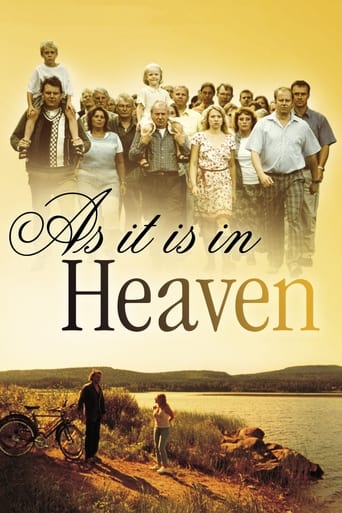

Not even bad in a good way
... View MoreLack of good storyline.
... View MoreDreadfully Boring
... View MoreThis is a small, humorous movie in some ways, but it has a huge heart. What a nice experience.
... View MoreThis film is unusual and inspiring. It tells a story of loss and grief that is healed through connecting with others - finding a community.
... View More(On Mon, 2/16/09, Kay Pollak wrote: Date: Monday, February 16, 2009, 4:55 AM Hej Stephan! Thank you for your exiting view of the movie. I recognize many thoughts, we who have made the film, had during the shooting. Kay Pollak. If everybody has found it's own sound: than, only then:... In spite of being the most beloved Swedish film (seen by 1 158 415 visitors for 88 500 317 SEK) this movie failed to receive a single Swedish Golden Beetle, the most prestigious Swedish film award and nominated for an Oscar. Genuine Swedish, a movie by and for the Swedes: their film. Writer and lecturer for 'new age' management psychology and again-director Kay Pollak reaches with this movie the Swedish Everyman's heart, belonging to the social democratic proletarian culture – yesterdays Artur Artur Lundkvist, Harry Martinsson, Vilhelm Moberg, Eyvind Johnson, Gösta Gustav Jansson, Nils Bohman and today Marianne Fredriksson, Linda Olsson. The social democratic idea allows individual development when the group has "found it's sound". Daniels mother, aware of this, crosses the border, promising a school outside the Swedish establishment. The Swedish model was designed for the Swedish working class. This class-travel of social rise aimed education, a better salary, triggering transitional conflicts. For a time "The Marginal Man"/woman (1937, E. Stonequist). The kaypollakquestion: is in todays globalization yesterdays social democratic idea still sound and safe? The kaypollakanswer can be found in the movies beginning and ending. The between: love, jealousy, domestic violence, intolerance are common events. Vi hear the summer wind, moving the cornfield and the violin playing boy Daniel, interrupted by sequences of the conductor Daniels breakdown, beaten by the village boy Conny and his friends. The widowed mothers promise violates the Swedish social democratic basics. The end of the movie: Daniels death or dream? Finding in the cornfield the boy Daniel, lifting him up in his arms - while the choir, initiated by the disabled Tony starts without the conductor and eventual joined by the audience. In his absence he is among them. One of them. The steadily growing choir is prepared by Daniel Dareus for this moment. The Swedish choir, joined by the Austrian audience, demonstrates the poor Swedes 'richness' (CJL Almqvist, Svenska fattigdomens betydelse, 1838). Guided by disabled disability. Thus can yesterdays social democratic idea, transformed, in spite of Swedish capitalistic backyard-egoism, participate in globalization. When each has found it's own sound: then, only then: As it is in heaven ...or as Helene Sjöholms Gabriela sings: "I want to feel that I have lived my life."
... View MoreThis Swedish film (with subtitles) well deserved its Best Foreign Film Academy Award nomination. With Michael Nyquist in a role far different than what he's known for -- plus a cast of quirky characters unknown to U.S. audiences, this story holds the viewer in captivity. Briefly: Nyquist plays a successful orchestra conductor who returns anonymously to the village of his youth where he was bullied as a child. Most all he encounters are new to him, though one big bully remains and plays a pivotal role in the story. Without giving too much away, I believe it's safe to say this movie is about life and death and the lessons we all need to learn before we die. Because I took issue with the director's quirky habit of cutting scenes off right in the middle of a serious moment, leaving the viewer to find out later what happened, I reserved one star. The acting and the story, however, just might make up for it. Brilliant.
... View MoreFirst of all, I am in LOVE with Michael Nyqvist. I just can't get enough of him!!!!!!! I first saw him in the Millennium trilogy, The Girl with the Dragon Tattoo, etc, he did with Noomi Rapace. Here he plays Daniel, a burnt-out conductor who moves back to his old town, after suffering a heart attack. He is then asked to give some suggestions to help improve the local church choir, which then turns into him leading the choir. He meets 2 ladies from the choir, Lena, a young musician, who falls in love with him, and Gabriella, a battered mother, who eventually flees from her abusive husband. Nyqvist gives a STELLAR performance here. The film makes you experience every kind of emotion possible. I laughed and cried. This should have won an Academy award for Best picture of 2004.
... View More